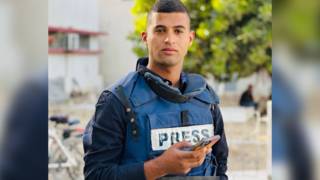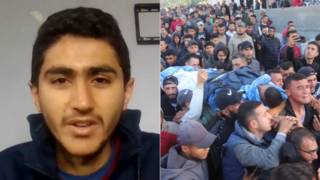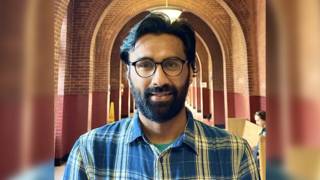
Guests
- Robert Gouldpresident of the San Francisco Bay Area chapter of Physicians for Social Responsibility. He wrote the foreword for the new international edition of the group’s report, “Body Count: Casualty Figures after 10 Years of the 'War on Terror.'”
- Hans Von Sponeckformer U.N. assistant secretary-general and U.N. humanitarian coordinator for Iraq, who in 2000 resigned his post in protest of the U.S.-led sanctions regime. He is the author of A Different Kind of War: The UN Sanctions Regime in Iraq. He is currently teaching at the University of Marburg.
- Brock McIntoshserved in Afghanistan from November 2008 to August 2009. He applied for conscientious objector status and was discharged in May 2014. He is a co-founder and member of Iraq Veterans Against the War.
As the United States begins bombing the Iraqi city of Tikrit and again delays a withdrawal from Afghanistan, a new report has found that the Iraq War has killed about one million people. The Nobel Prize-winning International Physicians for the Prevention of Nuclear War and other groups examined the toll from the so-called war on terror in three countries — Iraq, Afghanistan and Pakistan. The investigators found “the war has, directly or indirectly, killed around one million people in Iraq, 220,000 in Afghanistan and 80,000 in Pakistan. Not included in this figure are further war zones such as Yemen. The figure is approximately 10 times greater than that of which the public, experts and decision makers are aware. … And this is only a conservative estimate.” The true tally, they add, could be more than two million. We are joined by two guests who worked on the report: Hans von Sponeck, former U.N. assistant secretary-general and U.N. humanitarian coordinator for Iraq, who in 2000 resigned his post in protest of the U.S.-led sanctions regime; and Dr. Robert Gould, president of the San Francisco Bay Area chapter of Physicians for Social Responsibility.
Transcript
AMY GOODMAN: U.S.-led coalition warplanes have begun bombing the Iraqi city of Tikrit in an attempt to seize control of the city from the self-described Islamic State. The assault on Tikrit began three weeks ago when Iraqi forces and Iranian-backed Shiite militia launched a ground offensive. The U.S. airstrikes now squarely put Washington and Tehran on the same side in the fight, though the Obama administration insists it’s not coordinating military operations with Iran. The Pentagon stressed that the airstrikes are aimed to help Iraqi forces defeat the Islamic State, but by all accounts it has been Iranian-backed militias leading the ground attack in Tikrit, the hometown of former Iraqi President Saddam Hussein. Qasem Soleimani, the commander of the Quds Force of Iran’s Islamic Revolutionary Guards Corps, had been on the ground advising the militias in Tikrit as recently as Sunday.
Meanwhile, in other Iraq news, a new report has found the Iraq War has killed about one million people. The Nobel Prize-winning International Physicians for the Prevention of Nuclear War and other groups examined the toll from the so-called war on terror in three countries—Iraq, Afghanistan and Pakistan. The investigators found the war has, directly or indirectly, killed around one million people in Iraq, 220,000 in Afghanistan and 80,000 in Pakistan, a total of about 1.3 million.
We’re joined now by two guests who worked on the report. Hans von Sponeck is with us, former U.N. assistant secretary-general and U.N. humanitarian coordinator for Iraq, who in 2000 resigned his post in protest of the U.S.-led sanctions regime. He’s the author of A Different Kind of War: The UN Sanctions Regime in Iraq. Von Sponeck is currently teaching at the University of Marburg in Germany, joining us by Democracy Now! video stream. And Dr. Robert Gould is with us from San Francisco, the president of the San Francisco Bay Area chapter of Physicians for Social Responsibility. He wrote the foreword for the new international edition of the report, called “Body Count: Casualty Figures after 10 Years of the 'War on Terror.'”
Dr. Robert Gould, the figures laid out in this report say 1.3 million people have died in Iraq, in Afghanistan and in [Pakistan]. And it says that this could possibly be not an overestimate; it says it’s the minimum numbers. It could possibly be as high as two million. Can you talk about the significance of what these figures mean?
DR. ROBERT GOULD: Well, these are, as you relate, incredible figures in terms of the total counts, and they compare markedly with those estimates that have come out of organizations such as Iraq Body Count in the past, which use very—what are known as passive methods of detecting casualties in war, because they rely on official reports and morgues and things like that to arrive at their estimates. But obviously those type of methods really lack the ability to determine the full cost of war, given that, particularly in the type of warfare we witnessed in Iraq and Afghanistan and elsewhere, many of these deaths are really silent, in the sense that people are killed by death squads, they’re killed by bombing raids, that are really off the records, and we don’t get to really understand the full impact of the war. That’s why a number of the people who are incorporated within the new issue of “Body Count,” in terms of looking at the totality of the reports, there’s a very important examination of what we—of more active methods of sampling. And these are methods that have been used in diverse places such as Sudan, the Congo, for their various horrible war situations, as well. So, what this report really does is bring to us, in its North American release, a really fuller accounting of what the human costs of that war have been, which, you know, just listening to the headlines on the news this morning that you’ve related, we could still see the impacts of the destabilization that we, our government and allies, have created in Iraq and elsewhere.
AMY GOODMAN: And why the people particularly in the United States do not see anything like these numbers? The significance of what it would mean?
DR. ROBERT GOULD: Well, I think there has been, in a similar way to what our collective experience has been with the reporting in the Vietnam War, a real distancing of the impacts on the people over there. We have certainly accounted for the dead and wounded within—in terms of the numbers of U.S. troops and NATO forces in the various conflicts, but these deaths, this destruction, is, for variety of reasons, very deliberately or through self-censorship, kept from the American people so we don’t see these real costs. And I would also say we don’t see the connecting points about how these policies and that degree of death and destruction leads through the destabilization of these regions and the persistent killing that’s conducted by drone warfare, etc. We’re insulated from these effects and don’t understand the anger that arises from people who have been through, now 12 years in Iraq, the act of war, even longer in Afghanistan, what those effects are. And I would think that as a result, people are insulated from what—the milieu within which groups like ISIS arise. And at a time when we’re contemplating at this point cutting off our removal of troops from Afghanistan and contemplating new military authorization for increasing our operations in Syria and Iraq, this insulation from the real impacts serves our government in being able to continue to conduct these wars in the name of the war on terror, with not only horrendous cost to the people in the region, but we in the United States suffer from what the budgetary costs of unending war are.
AMY GOODMAN: Again, this report, “Body Count,” that 1.3 million figure includes Iraqi, Afghan and Pakistani dead; it does not include areas like Yemen.
DR. ROBERT GOULD: Correct.
AMY GOODMAN: We’re also joined by Hans von Sponeck, former U.N. assistant secretary-general and former U.N. humanitarian coordinator for Iraq, who in 2000 resigned his post in protest of the U.S.-led sections regime. Dr. von Sponeck, I thank you for joining us. Can you respond, as a person who’s been deeply involved in Iraq—as we speak today, the U.S. is leading the bombing of Tikrit, what, 12 years after the U.S. first invaded Iraq—to this report that you have written an introduction for, called “Body Count”?
HANS VON SPONECK: Well, first of all, good morning, Amy. Good to hear you. I’m sorry we can’t see each other.
But let me just say that it is, in my experience, not surprising that, ultimately, we see courage coming out of the United States in terms of facing the truth, the facts. Dianne Feinstein has done that in December with the release of the CIA torture report. The Physicians for Social Responsibility, together with IPPNW in other parts of the world, have now released the “Body Count” report, which is, both documents, I think, an incredibly powerful and valuable basis for which to discuss—at long last discuss—the possibility of redress and learning—learning, for example, that all these interactions, whether it was in Iraq or in Afghanistan or in Syria or in Libya, the regime change approach to solving problems of international relations have no future, should not have a future. It’s so clear now. The “Body Count” report makes it very clear that not only that young men and women in uniform, but also innocent civilians, once again, become victim.
What I very much hope is that the “Body Count” publication will not—will not lead to a futile debate on the accuracy of data. It reminds me of the 2000 release by UNICEF of the child mortality study on Iraq, where the debate that should have taken place about the causes of all that was detoured by a debate on whether Lancet or “Body Count” or any other documentation had the correct figures. I think that’s totally, in my view, irrelevant. We have enough credible data from different sources, and the “Body Count” publication is an attempt to show the most recent efforts to at least get credible indicators, not the hardcore, empirical facts—not possible. And I think that is the importance of all of this, that we use that as a basis for a long-overdue debate in Washington, in London, and certainly at the United Nations in New York, as to why this all happened and how one can try and prevent this from recurring in the future.
AMY GOODMAN: Your response to the U.S. bombing Tikrit now?
HANS VON SPONECK: Well, it sounds maybe too simple to just say, “Look, what we are seeing now is what we—what the seeds have grown.” Many people will probably disagree strongly in the United States when I say that ISIS is a relative of a Western intervention. ISIS, as it developed, developed after the 19th of March, 2003. Not to acknowledge that, I think, is pursuing an ostrich policy. It was the way an occupation force behaves that created the first seeds of an ISIS. The Sunni belt in central Iraq, that suddenly was faced with an understanding that they had no future, that it was a Shia future, the disbanding of—we know all these things—of the army, of the bureaucracy, all against the Hague Convention, that doesn’t allow for structural changes by an occupation army—all that led to a reaction. And a lot of reasons why ISIS is today in Tikrit has to do with the fact that very normal Sunnis and other Iraqi citizens felt that they were betrayed, and they started to rise, and they started to support the extreme elements that we now see face to face with militias of Shia origin, with Iranian forces and the Iraqi military, of course, also. So, ISIS in Tikrit goes back to March 2003. That’s the point I’m trying to make.
AMY GOODMAN: On Tuesday, I participated in a conference at Hofstra University on Long Island, which was assessing the George W. Bush presidency. I want to turn to a clip of my exchange with John Negroponte, a man that you know well. He was the U.S. ambassador to Iraq and the former director of national intelligence.
AMY GOODMAN: Just a quick question. Mr. Goss said, “If we knew then what we know today, we might have done things differently,” which I think is a very reasonable thing to say.
PORTER GOSS: Thank you.
AMY GOODMAN: Do you think that, Mr. Negroponte, that knowing what we know today, the Iraq War was wrong? And do you think torture is wrong?
JOHN NEGROPONTE: Look, well, torture is never right. And—
AMY GOODMAN: Do think the Bush administration was wrong to engage in it?
JOHN NEGROPONTE: I say torture is never right. That’s my first point.
But my second point was, I’ll just stick with the way I felt during the time I lived through those events. And you can find quotes of what I said when I was ambassador to the U.N. I was asked if I thought we should use force in Iraq. And I said, well, in questions like this, I think we ought to approach the issue with a great deal of caution. I also said that we ought to—and I felt that we ought to—allow the inspection process more time to do its work. I was disappointed that it wasn’t allowed. But, you know, you have one president at a time. He’s the commander-in-chief. He’s got the constitutional authority, and that’s what he decided to do.
The last point I would make, to your issue about Hans Blix and Mohamed ElBaradei, Blix and I had a chance to reminisce about this a little bit later on. And I said to him, “It’s amazing, you know? We set up this inspection thing, and we never found anything. And, you know, what the heck happened?” And Blix said, “You know, it’s—that’s right.” But he said, “I can’t—I still don’t understand why Saddam behaved so guilty.” And maybe that’s why he had some doubt, because he was—Saddam sort of emitted, emanated, this sort of sensation that he had—that he was hiding something. Now, some people have speculated—and I think it was an FBI agent who had interviewed him extensively—that, actually, he wanted some people to think that he had WMD in his neighborhood in the wake of the Iran-Iraq War, and so that maybe this was part of his strategy. But it kind of—if indeed it was his strategy, it boomeranged.
AMY GOODMAN: Hans von Sponeck, if you could respond to what the former U.S. ambassador to Iraq and the former head of national intelligence, John Negroponte, said at this session? You are the former U.N. assistant secretary-general and former U.N. humanitarian coordinator for Iraq.
HANS VON SPONECK: Well, you know, Ambassador Negroponte was a well-known figure in my days in Baghdad, and I know where he’s coming from. What he has to say about the perception or the question why Saddam Hussein didn’t disclose that he had no weapons of mass destruction, I think that speculation surprises me. I think any political analyst should have really understood very quickly, if he or she knew the constellation in the Middle East, the war of eight years between Iraq and Iran. Saddam Hussein, as a self-appointed leader of the region, didn’t want to show that he was weak, that he had an army that would have no chance against any neighbor because of the poor equipment and whatever. So he didn’t want. It was a question of cultural response and shame, shame. He was ashamed to admit that he was really nobody’s—nobody’s foe. Nobody could take him seriously. So that is one reason why I think Saddam Hussein acted the way he did.
This business, the statement, torture is never right—every single page of the 200 pages that I have read as of today of the CIA torture report released by the U.S. Senate, every page is an admission of confusion, a lack of cooperation among the CIA, the FBI, the Department of State, other—the legal authorities. And that made it possible, that horrific violation of U.S. national as well as international law—Geneva Convention, Hague Convention—all these documents that say the right things were violated by the most unbelievable cruelty of these—yeah, these adopted extended interrogation techniques, performed, and the suffering that resulted from that.
And there is only one thing, Amy, that I feel is missing. It took a lot of courage for the release of that report. That has to be acknowledged. And I hope that people, countries around the world do so. But there’s a word missing. In these 500 pages that are released, there should somewhere a reference to accountability. Impunity cannot possibly be an answer in dealing with what we are reading in that document. So, I’d hope that Mr. Negroponte would go a little bit beyond just saying torture is never right. Well, that was known at the time when he was the head of the intelligence community, and what was done about it?
AMY GOODMAN: And Ambassador Negroponte saying he felt that the U.S. moved into war too quickly in Iraq, that he wanted the inspections to continue, did that ring true for you from your experience of him in Iraq, though he came a bit later, after the war began?
HANS VON SPONECK: If I understood you correctly here, I think it is very clear, from what my colleague Hans Blix pleaded for—and that is, “Give me three more months, and I will then conclusively be able to tell you that Iraq is quantitatively disarmed”—qualitatively, Iraq was, anyway—that was known in the intelligence community—no longer a threat to anybody. But he wanted to go that last step, that would have shown that disarmament, as arms inspectors have said ever since 1995, had really progressed to the point where one could declare Iraq, from the perspective of weapons of mass destruction, as disarmed. But that opportunity wasn’t given to him.
AMY GOODMAN: Hans von Sponeck, I know you to leave for a funeral, but I wanted to ask you one last question. You, together with another former U.N. assistant secretary-general, Denis Halliday, have been working on this issue of accountability. Can you explain what you’ve been doing?
HANS VON SPONECK: Well, if I have a moment, then let me just say that Denis Halliday and I, first of all, we are in weekly contact with each other to compare notes and synchronize our approaches. We both are three—or, two out of three commissioners of a war crimes tribunal that was established by the former prime minister of Malaysia, Dr. Mahathir, in 2005. We have been trying hard to prepare very seriously collected evidence of torture performed at different levels in Iraq during the years of occupation. We interviewed—the famous picture of the man in the hood that went around the world, we interviewed this man in the hood in Kuala Lumpur. We talked to many of the torture victims from Abu Ghraib, from Bagram, from Guantánamo. So, this overwhelming body of evidence was published in two volumes that were sent in 2012 to the International Criminal Court. And the sobering response from there was, “Sorry, we are not responsible for a case like that.” Well, parties have changed. There is a new chief prosecutor in The Hague. And we are now—in mid-April, on the 18th of April, in fact, the War Crimes Commission will meet yet again in Kuala Lumpur to prepare for the second, and hopefully last, draft submission of this documentation to the International Criminal Court.
I should also like to add that last June I personally handed, in the House of Commons and the House of Lords in the U.K., these volumes of evidence, in the hope that this would generate the discussion about these issues in the British political circles. That hasn’t happened. But we are not going to give up. We are not blind or hateful even—that would be terrible—extremists in our demands, but we insist that impunity cannot be the answer. And we are very much, Amy, encouraged by these moments of light, like the publication of the CIA torture report, by the fact that the professional medical community in the United States, the Physicians for Social Responsibility, had the courage to go along in publishing this document now. So, more and more parties are coming together, and I hope that it will lead to that which, if nothing else, we owe to also the Iraqi people, to gain their dignity back, to recognize—for them to recognize that the world doesn’t accept what has happened, and the courts, hopefully, in the United States and in the U.K. will start the proceedings.
AMY GOODMAN: Hans von Sponeck, I want to thank you very much for being with us, former U.N. assistant secretary-general, former U.N. humanitarian coordinator for Iraq, who in 2000 resigned his post in protest of the U.S.-led sanctions regime, author of A Different Kind of War: The UN Sanctions Regime in Iraq. And I want to thank Dr. Robert Gould, president of the San Francisco Bay Area chapter of Physicians for Social Responsibility. He wrote the foreword for the new international edition of the group’s report, “Body Count: Casualty Figures after 10 Years of the 'War on Terror.'” Hans von Sponeck was joining us from near Freiburg, Germany, where he lives. This is Democracy Now!, democracynow.org, The War and Peace Report. We’ll be back in a minute.












Media Options